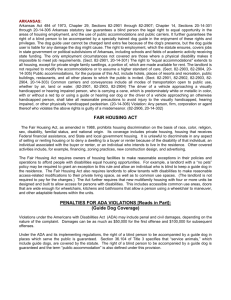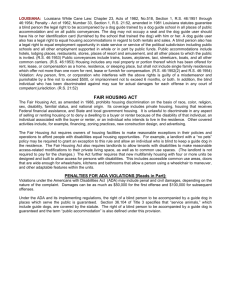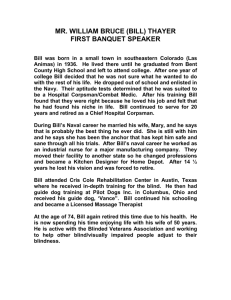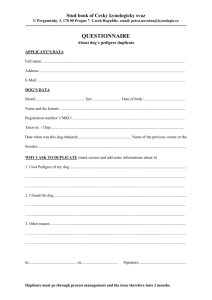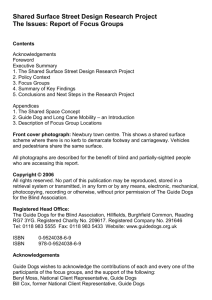Mississippi Statutes, Code of 1972
advertisement
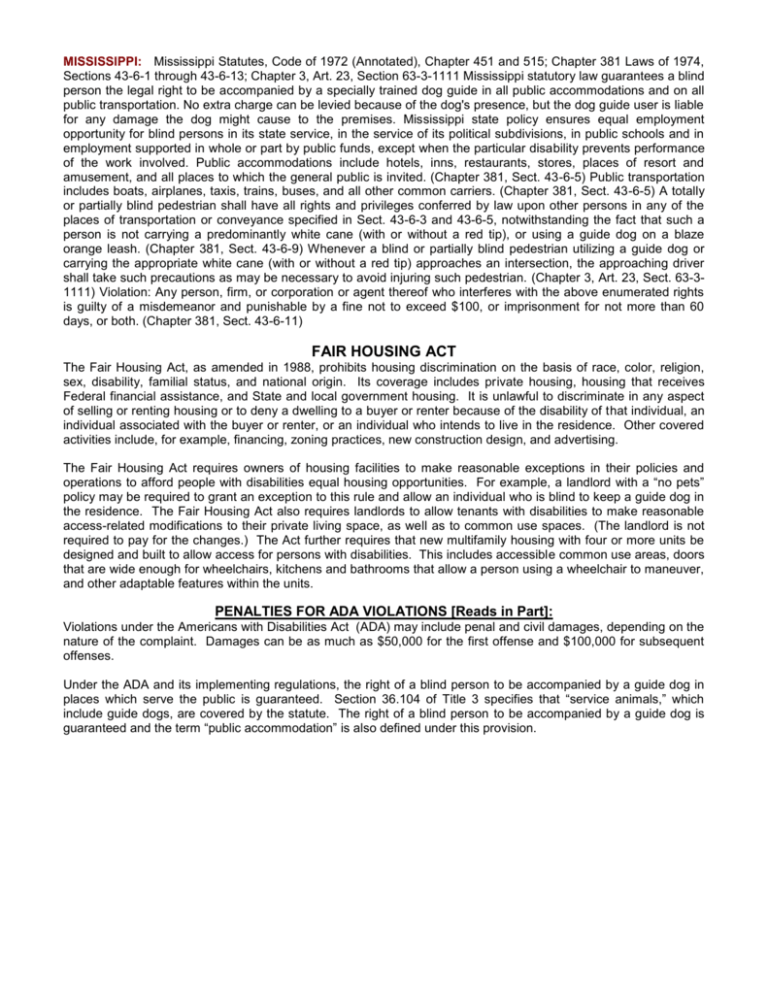
MISSISSIPPI: Mississippi Statutes, Code of 1972 (Annotated), Chapter 451 and 515; Chapter 381 Laws of 1974, Sections 43-6-1 through 43-6-13; Chapter 3, Art. 23, Section 63-3-1111 Mississippi statutory law guarantees a blind person the legal right to be accompanied by a specially trained dog guide in all public accommodations and on all public transportation. No extra charge can be levied because of the dog's presence, but the dog guide user is liable for any damage the dog might cause to the premises. Mississippi state policy ensures equal employment opportunity for blind persons in its state service, in the service of its political subdivisions, in public schools and in employment supported in whole or part by public funds, except when the particular disability prevents performance of the work involved. Public accommodations include hotels, inns, restaurants, stores, places of resort and amusement, and all places to which the general public is invited. (Chapter 381, Sect. 43-6-5) Public transportation includes boats, airplanes, taxis, trains, buses, and all other common carriers. (Chapter 381, Sect. 43-6-5) A totally or partially blind pedestrian shall have all rights and privileges conferred by law upon other persons in any of the places of transportation or conveyance specified in Sect. 43-6-3 and 43-6-5, notwithstanding the fact that such a person is not carrying a predominantly white cane (with or without a red tip), or using a guide dog on a blaze orange leash. (Chapter 381, Sect. 43-6-9) Whenever a blind or partially blind pedestrian utilizing a guide dog or carrying the appropriate white cane (with or without a red tip) approaches an intersection, the approaching driver shall take such precautions as may be necessary to avoid injuring such pedestrian. (Chapter 3, Art. 23, Sect. 63-31111) Violation: Any person, firm, or corporation or agent thereof who interferes with the above enumerated rights is guilty of a misdemeanor and punishable by a fine not to exceed $100, or imprisonment for not more than 60 days, or both. (Chapter 381, Sect. 43-6-11) FAIR HOUSING ACT The Fair Housing Act, as amended in 1988, prohibits housing discrimination on the basis of race, color, religion, sex, disability, familial status, and national origin. Its coverage includes private housing, housing that receives Federal financial assistance, and State and local government housing. It is unlawful to discriminate in any aspect of selling or renting housing or to deny a dwelling to a buyer or renter because of the disability of that individual, an individual associated with the buyer or renter, or an individual who intends to live in the residence. Other covered activities include, for example, financing, zoning practices, new construction design, and advertising. The Fair Housing Act requires owners of housing facilities to make reasonable exceptions in their policies and operations to afford people with disabilities equal housing opportunities. For example, a landlord with a “no pets” policy may be required to grant an exception to this rule and allow an individual who is blind to keep a guide dog in the residence. The Fair Housing Act also requires landlords to allow tenants with disabilities to make reasonable access-related modifications to their private living space, as well as to common use spaces. (The landlord is not required to pay for the changes.) The Act further requires that new multifamily housing with four or more units be designed and built to allow access for persons with disabilities. This includes accessible common use areas, doors that are wide enough for wheelchairs, kitchens and bathrooms that allow a person using a wheelchair to maneuver, and other adaptable features within the units. PENALTIES FOR ADA VIOLATIONS [Reads in Part]: Violations under the Americans with Disabilities Act (ADA) may include penal and civil damages, depending on the nature of the complaint. Damages can be as much as $50,000 for the first offense and $100,000 for subsequent offenses. Under the ADA and its implementing regulations, the right of a blind person to be accompanied by a guide dog in places which serve the public is guaranteed. Section 36.104 of Title 3 specifies that “service animals,” which include guide dogs, are covered by the statute. The right of a blind person to be accompanied by a guide dog is guaranteed and the term “public accommodation” is also defined under this provision.
